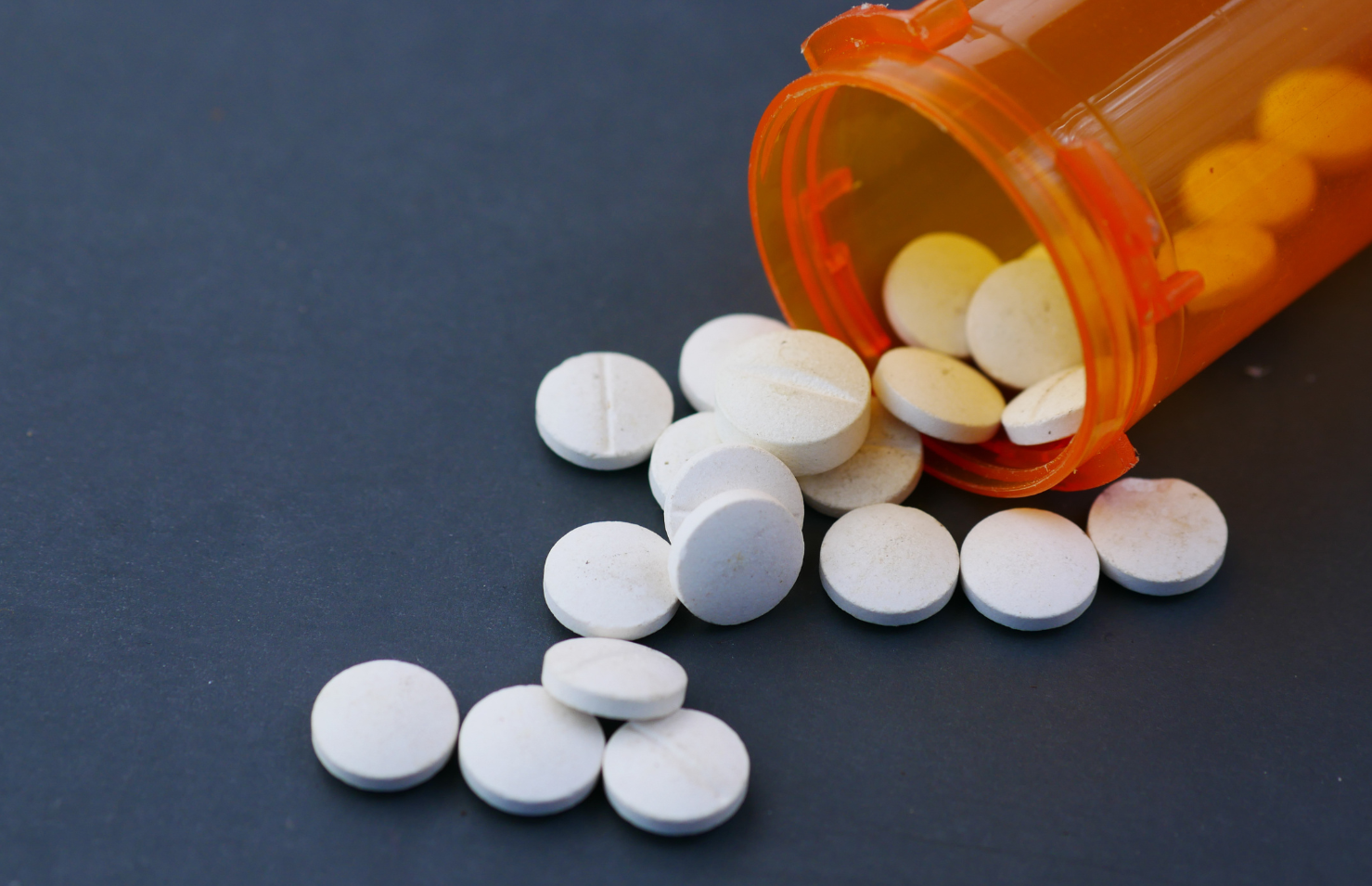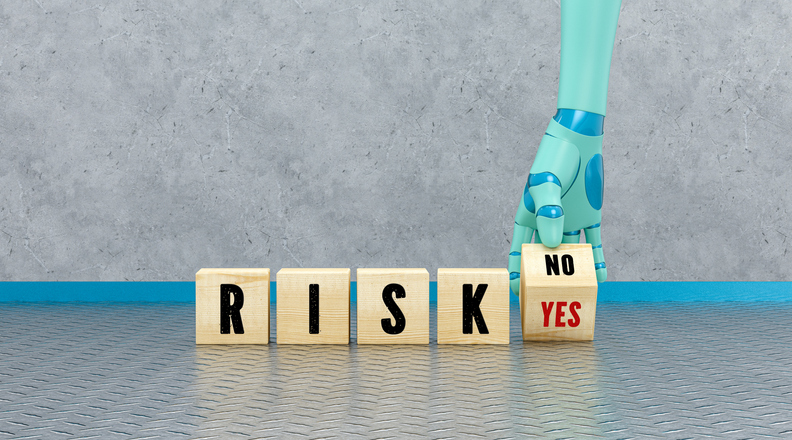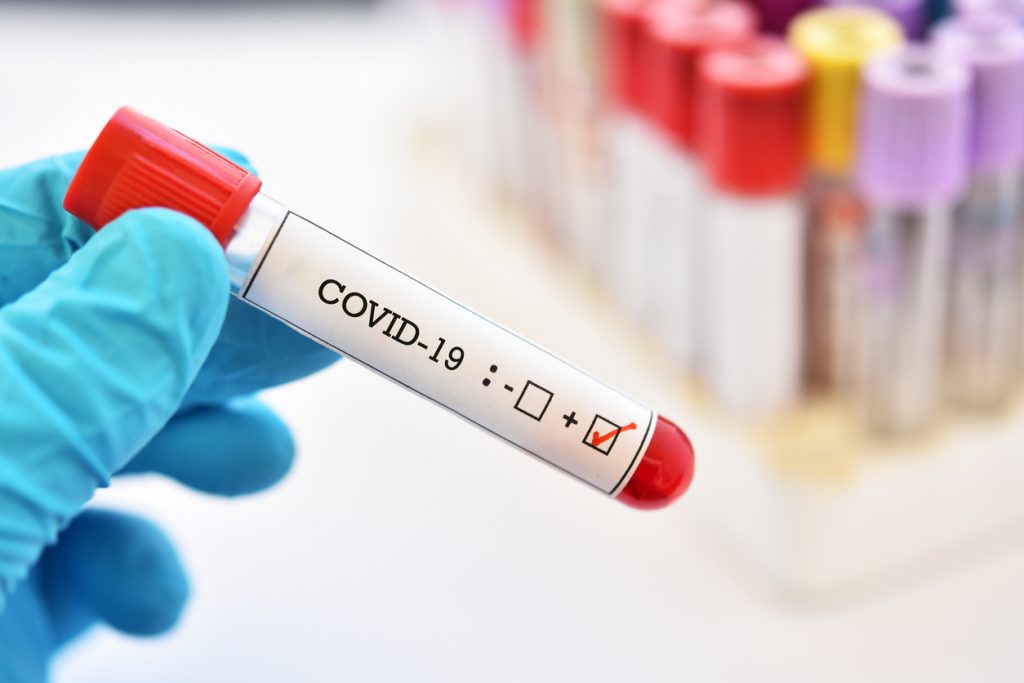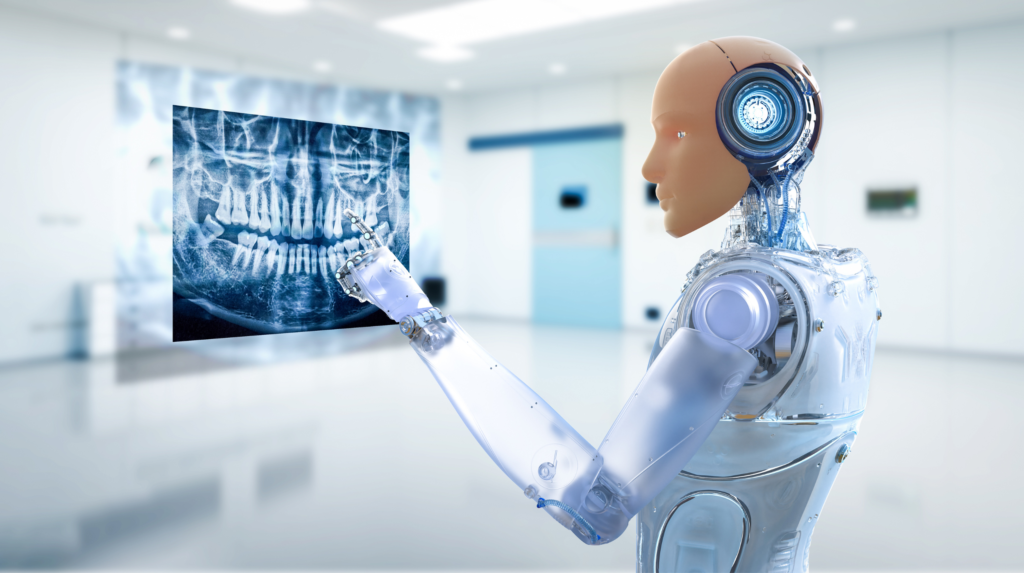The process of discovering new drugs has always been a complex and costly endeavor. Traditional methods often involve a lengthy and labor-intensive journey, from initial target identification to final approval and market release. This process can take over a decade and cost billions of dollars, with high failure rates at every stage.
The rise of Artificial Intelligence (AI) is transforming the landscape of drug discovery, offering promising solutions to streamline this process, reduce costs, and improve success rates. In this article, we will explore how to use AI for drug discovery, delve into the applications and benefits of generative AI models in this field, and discuss the new frontiers of AI for drug discovery and development. Whether you are a healthcare professional, researcher, or someone simply interested in the advancements of AI in medicine, this comprehensive guide will provide valuable insights into the burgeoning field of AI in drug discovery and how you can easily benefit from it as well.
Drug Discovery: The Traditional Approach of Trial and Error
The traditional drug discovery process is an intricate and multi-stage endeavor that typically spans several years and involves various scientific disciplines. It begins with target identification, where researchers aim to pinpoint a biological target associated with a disease.
This target could be a protein, gene, or other molecular structure involved in the disease’s progression. Once a target is identified, the next step is lead discovery, where potential drug candidates are identified. This often involves screening large libraries of compounds to find molecules that interact with the target.
The Challenges with the Traditional Approach to Drug Discovery
Despite the systematic approach, the traditional drug discovery process is full of challenges. One of the primary issues is the time and cost involved. On average, a study by PhRMA found that it takes around 10 to 15 years to bring a new drug to the market. PhRMA also noted that the average cost of it can be as much as $2.6 billion. This high cost is largely due to the extensive testing required to ensure safety and efficacy, which includes preclinical testing in the lab and on animals, followed by multiple phases of clinical trials in humans.
Another significant challenge is the high failure rate. Many potential drugs fail at various stages of development due to issues such as toxicity, lack of efficacy, or unforeseen side effects. According to the BIO report, fewer than 10% of drug candidates make it past Phase I. This high attrition rate means that pharmaceutical companies must invest heavily in multiple projects simultaneously, hoping that a few will succeed.
Difference Between Drug Discovery and Drug Development
It’s important to distinguish between drug discovery and drug development. Drug discovery refers to the initial stages of research where new candidate medications are identified and tested for their interaction with biological targets. This includes target identification, lead discovery, and lead optimization.
On the other hand, drug development encompasses the later stages, including preclinical testing, clinical trials, regulatory approval, and post-market surveillance. While drug discovery focuses on finding promising new compounds, drug development ensures these compounds are safe and effective for human use.
AI for Drug Discovery and Development
Artificial Intelligence offers solutions to many challenges inherent in traditional drug discovery methods. By leveraging AI, researchers can significantly speed up the process of target identification and lead discovery. Machine learning algorithms can analyze vast datasets, identifying potential drug targets and predicting how compounds will interact with these targets. This reduces the need for extensive experimental screening, saving time and money.
AI can also improve the accuracy of predictions regarding a drug’s safety and efficacy. For example, AI models can analyze preclinical data to predict potential toxicities or adverse effects, allowing researchers to address these issues earlier in development. This increases the chances of success and minimizes the chances of failure in later stages.
While the traditional drug discovery process is crucial for developing new treatments, it is often slow, expensive, and prone to high failure rates. AI has the potential to transform this process, offering faster, more cost-effective, and more reliable methods for discovering and developing new drugs.
What AI Can Do for Drug Discovery
Artificial Intelligence (AI) is revolutionizing various industries, and its impact on drug discovery is particularly significant. AI in drug discovery involves the application of machine learning algorithms, neural networks, and other advanced computational techniques to streamline and enhance various stages of the drug development process.
By leveraging vast amounts of biological and chemical data, AI can uncover insights that would be difficult or impossible to discern using traditional methods. This transformation is not just theoretical but actively changing how pharmaceutical companies and researchers approach drug discovery.
Benefits of AI in Drug Discovery
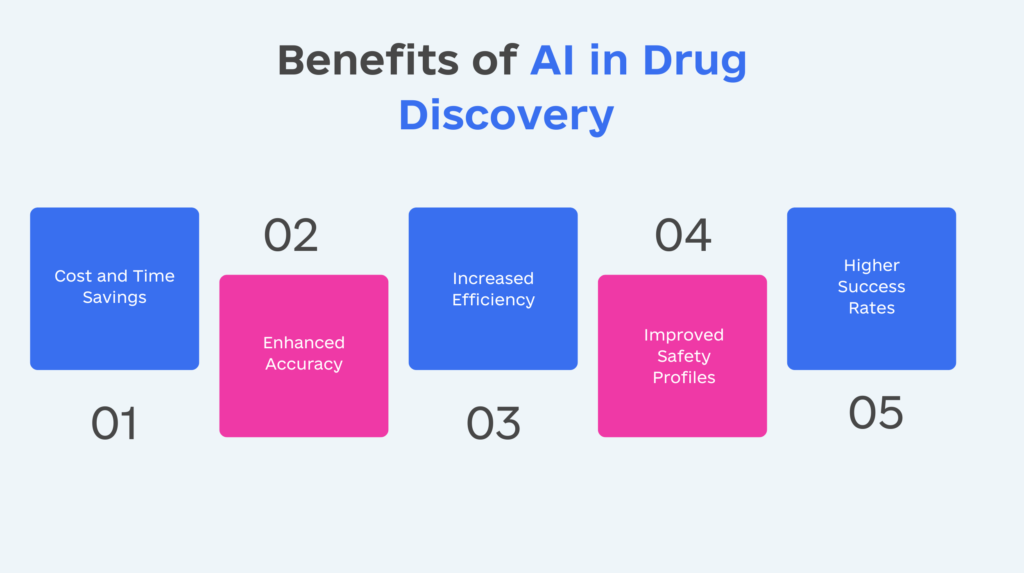
One of the primary benefits of using AI for drug discovery is the potential for significant cost and time savings. Traditional drug discovery processes can take up to 15 years and cost over $2 billion. AI can reduce these timelines and costs by automating many labor-intensive tasks and providing more accurate drug efficacy and safety predictions. For example, AI algorithms can quickly analyze large datasets to identify promising drug candidates, predict their interactions with biological targets, and optimize their chemical structures to enhance their effectiveness.
Another benefit is the increased accuracy and efficiency of the drug discovery process. AI systems can process and analyze vast amounts of data much faster than human researchers, identifying patterns and correlations that might be missed otherwise. This capability is particularly useful in the early stages of drug discovery, such as target identification and lead optimization. AI can predict how different compounds will interact with a target protein, helping researchers focus on the most promising candidates and reduce the number of compounds that need to be tested experimentally.
Furthermore, AI can improve the safety profile of new drugs. By analyzing data from preclinical studies, AI can predict potential side effects and toxicities, allowing researchers to modify compounds early in development. This reduces the likelihood of failure in later stages, such as clinical trials, and increases the chances of bringing a safe and effective drug to market.
AI Drug Discovery Market Size
The AI drug discovery market is growing rapidly, reflecting the increasing adoption of AI technologies in the pharmaceutical industry.
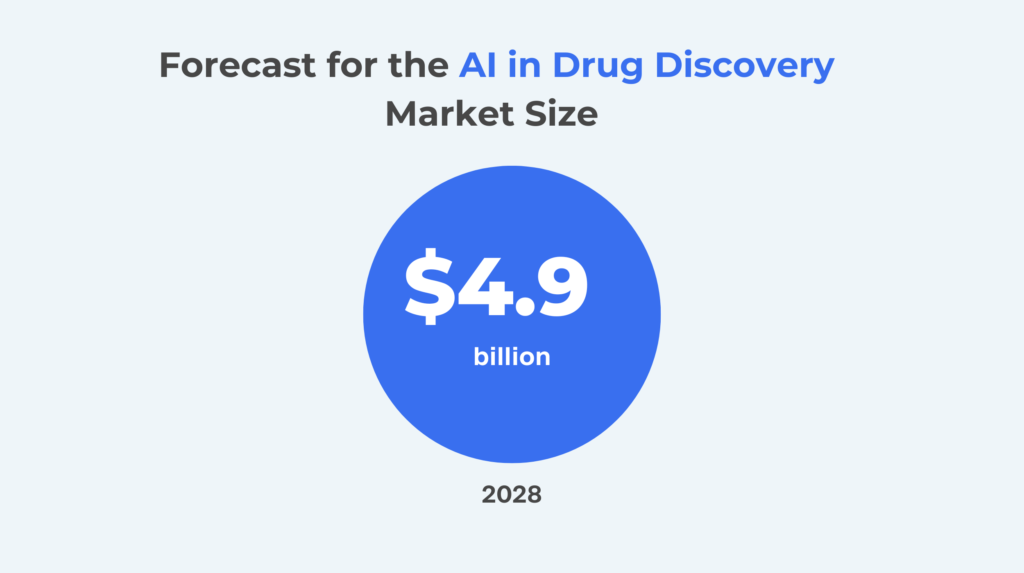
According to a report by Markets and Markets, the global AI in drug discovery market was valued at an estimated $900 million in 2023 and is expected to grow at a 40.2% compound annual growth rate (CAGR) from 2023 to 2028, hitting the $4.9 billion mark by 2028. This growth is driven by several factors, including the rising prevalence of chronic diseases, the need for more efficient drug discovery processes, and advancements in AI technology.
Leading pharmaceutical and biotech firms invest heavily in AI to enhance their drug discovery capabilities. For example, companies like Pfizer, GlaxoSmithKline, and Novartis have partnered with AI-focused startups to integrate AI into their research and development processes. These collaborations aim to leverage AI’s capabilities to accelerate the discovery of new drugs and improve their success rates.
Governments and regulatory bodies also recognize the potential of AI in drug discovery and provide support through funding and favorable policies. For instance, the US Food and Drug Administration (FDA) has launched initiatives to promote the use of AI in medical research, highlighting the growing acceptance and importance of AI in the pharmaceutical industry.
How Artificial Intelligence is Changing Drug Discovery
Integrating AI into drug discovery is a transformative shift for the pharmaceutical industry in discovering and developing drugs. AI enables researchers to explore new frontiers in drug discovery and development, such as precision medicine and personalized treatments. By analyzing genetic, environmental, and lifestyle data, AI can help identify the most effective treatments for individual patients, paving the way for more personalized and targeted therapies.
AI integration also opens up new possibilities for drug repurposing, which involves finding new therapeutic uses for existing drugs. This approach can significantly reduce the time and cost of bringing new treatments to market, as existing drugs have already undergone extensive safety testing. AI algorithms can analyze vast datasets to identify potential new uses for existing drugs, accelerating drug discovery and expanding the range of available treatments.
AI is playing a crucial role in transforming the drug discovery process, offering significant benefits in terms of cost savings, efficiency, accuracy, and the development of personalized treatments. As the AI drug discovery market grows, the pharmaceutical industry will increasingly rely on AI to drive innovation and improve patient outcomes.
Nobel-Winning Innovations Accelerate Drug Discovery
The 2024 Nobel Prize in Chemistry highlights the groundbreaking role of proteins as life’s chemical tools and the transformative potential of AI in biological research. David Baker’s work on designing entirely new kinds of proteins and Demis Hassabis and John Jumper’s development of the AI model AlphaFold2 have revolutionized how we understand and utilize proteins. AlphaFold2 solves the once intractable challenge of predicting protein structures from amino acid sequences, offering unprecedented insights for scientific applications. In drug discovery, these advancements enable more precise identification of potential therapeutic targets and accelerate the development of novel treatments.
The Key Applications of AI in Drug Discovery
Generative AI Models for Drug Discovery
Generative AI models are revolutionizing the field of drug discovery by creating new molecules with desired properties. These models use advanced algorithms to generate potential drug candidates from scratch, significantly speeding up the initial stages of drug discovery. One popular approach is using Generative Adversarial Networks (GANs) and Variational Autoencoders (VAEs) to design novel compounds. These AI models can explore a vast chemical space and produce molecules that are more likely to be effective against specific biological targets.
Generative AI for drug discovery allows researchers to predict the properties of new compounds before they are synthesized, thus saving valuable time and resources. For example, Insilico Medicine used generative AI to identify six new drug candidates for fibrosis in just 46 days, demonstrating the potential of AI to expedite the drug discovery process significantly.
By leveraging generative AI models, pharmaceutical companies can enhance their drug pipelines and increase the chances of discovering breakthrough treatments. These models help identify novel chemical entities that traditional methods might miss, opening up new avenues for developing innovative therapies.
AI in Target Identification and Validation
Target identification and validation are critical steps in the drug discovery process. AI technologies are transforming these stages by analyzing vast datasets to pinpoint potential drug targets more accurately and efficiently. Traditionally, identifying a drug target involved a combination of biochemical assays, cell-based assays, and animal studies, which are time-consuming and expensive.
AI algorithms, particularly machine learning models, can analyze genomic, proteomic, and clinical data to identify biological targets associated with specific diseases. These models can process and interpret complex biological data, revealing previously unknown targets that could be therapeutically relevant. For example, Atomwise uses structure-based drug design and deep learning to predict how drug molecules will interact with target proteins, thereby enhancing the precision of drug development.
Once a target is identified, AI can also aid in its validation. Validation involves confirming that the target plays a critical role in the disease process and that modulating this target will have a therapeutic effect. AI models can analyze experimental data and predict the outcomes of target modulation, reducing the reliance on costly and time-consuming lab experiments. This capability accelerates the transition from target identification to lead discovery, bringing potential treatments closer to clinical trials.
Predicting The Bioactivity of Drug Candidates
Predicting the bioactivity of drug candidates is another area where AI is making a substantial impact. Traditional methods of assessing bioactivity involve extensive lab work and experimental screening, which can be both slow and expensive. AI, however, can predict the bioactivity of new compounds using techniques like Quantitative Structure-Activity Relationship (QSAR) modeling and molecular docking.
QSAR models use machine learning algorithms to analyze the chemical structure of compounds and predict their biological activity. These models can identify key molecular features that contribute to a compound’s effectiveness, helping researchers design more potent and selective drugs. For instance, AI can predict a compound’s solubility, bioavailability, and toxicity based on its chemical structure, guiding the optimization of lead candidates.
Molecular docking, another AI-powered technique, simulates the interaction between a small molecule and a target protein. By predicting the binding affinity of a compound to its target, molecular docking helps researchers identify promising drug candidates without the need for extensive experimental screening. AI algorithms can evaluate thousands of compounds in silico, prioritizing those with the highest potential for further development.
Deep learning techniques further enhance these predictions by analyzing large datasets of compounds and their biological activities. These algorithms can identify complex patterns and relationships between chemical structures and their effects on biological targets, providing more accurate predictions of bioactivity. This capability is particularly valuable in early-stage drug discovery, where rapid and reliable predictions can significantly reduce the time and cost of identifying viable drug candidates.
AI in Quality Assurance
Ensuring the quality and safety of drugs is paramount in the pharmaceutical industry. AI is playing a crucial role in enhancing quality assurance by automating various aspects of the quality control process. AI-powered systems can monitor the manufacturing process in real-time, detecting anomalies and ensuring that drugs meet stringent quality standards.
One application of AI in quality assurance is using computer vision algorithms to inspect drug samples. These algorithms can analyze images of drug products to detect defects such as discoloration, contamination, or improper packaging. This automated inspection process is faster and more accurate than manual inspections, reducing the likelihood of errors and ensuring consistent product quality.
AI can also predict and prevent equipment failures in manufacturing facilities. By analyzing sensor data from production equipment, AI algorithms can identify patterns that indicate potential issues, allowing for proactive maintenance. This predictive maintenance helps prevent downtime and ensures the reliability of the manufacturing process, contributing to the overall quality of the final product.
AI can help detect fraud and ensure compliance with regulatory standards. AI algorithms can analyze sales and distribution data to identify unusual patterns that may indicate fraudulent activity. This capability helps pharmaceutical companies safeguard the integrity of their products and maintain trust with consumers and regulatory bodies.
By leveraging AI, the pharmaceutical industry can accelerate the development of new drugs, reduce costs, and improve the safety and efficacy of treatments.
How AI Can Accelerate Clinical Trials
AI will be crucial in improving clinical trials, making them much faster and more efficient.
AI in Patient Recruitment
One of the most challenging aspects of clinical trials is patient recruitment. Finding eligible participants who meet the specific criteria for a study can be time-consuming and costly. AI for drug discovery can streamline this process significantly. By analyzing electronic health records (EHRs), AI algorithms can quickly identify potential candidates who fit the trial’s inclusion and exclusion criteria. This speeds up recruitment and ensures a more precise selection of participants, improving the trial’s chances of success.
Optimizing Trial Design
AI can also enhance the design of clinical trials. Traditional trial designs often rely on a one-size-fits-all approach, which can be inefficient. AI algorithms can analyze historical clinical trial data and real-world evidence to identify optimal trial designs. For example, AI can help determine the best sample size, identify subgroups of patients who are more likely to respond to the treatment, and predict potential side effects. This data-driven approach allows for more adaptive trial designs, which can be modified based on interim results to improve outcomes.
Real-Time Monitoring and Data Analysis
Once a clinical trial is underway, AI can provide real-time monitoring and data analysis. Wearable devices and remote monitoring tools equipped with AI can track patient vital signs and other health metrics, providing continuous data streams to researchers. AI algorithms can analyze this data in real-time, identifying trends and detecting adverse events early. This capability allows for prompt interventions, improving patient safety and trial efficacy.
AI in Drug Repurposing and Combination Analysis
Drug repurposing involves finding new therapeutic uses for existing drugs, offering a quicker and more cost-effective path to market than developing new drugs from scratch.
AI is also revolutionizing the analysis of drug combinations, which can be particularly effective for treating complex diseases like cancer. By analyzing molecular and clinical data, AI algorithms can predict the synergistic effects of different drug combinations.
AI is transforming drug repurposing and combination analysis by providing powerful tools to identify new therapeutic uses for existing drugs and optimize drug combinations.
Achievion Solutions has been at the forefront of leveraging AI to enhance drug repurposing and combination analysis. A prime example is their AI Drug Effectiveness Prediction Software. In this project, Achievion developed an AI-powered solution capable of predicting the effectiveness of various drug combinations for treating complex diseases. The software analyzes vast molecular and clinical information datasets to identify potential synergies between drugs, allowing healthcare providers to optimize treatment plans for conditions like cancer.
This solution has demonstrated its ability to streamline drug discovery by accurately predicting which drug combinations are most likely to yield successful outcomes. This enhances the efficiency of drug development and improves patient care by identifying the most effective treatments more quickly. By employing AI in this manner, Achievion Solutions is helping to unlock new therapeutic possibilities and accelerate the development of innovative treatments.
Ready to Accelerate Drug Discovery? Use AI to Unlock New Drug Discovery Possibilities!
As AI continues to advance, its potential to discover new therapies and improve patient outcomes will only grow. The future of drug discovery is bright, with AI at the helm, paving the way for more personalized and effective treatments.
Achievion Solutions is dedicated to advancing healthcare through cutting-edge AI technology. Our tailored AI solutions for drug discovery are designed to meet the unique needs of pharmaceutical companies and research institutions. Whether you’re looking to accelerate drug repurposing efforts, optimize clinical trial designs, or explore new therapeutic avenues, Achievion has the expertise and technology to help you achieve your goals.
Contact Achievion today to discover how our AI-powered solutions can transform your drug discovery process and bring innovative treatments to market faster.



